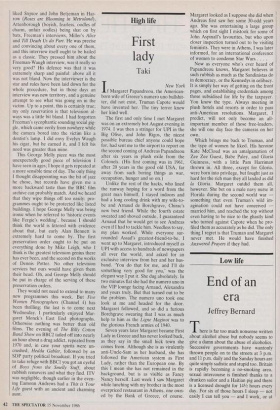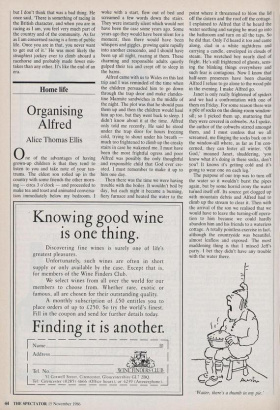Low life
End ©f an era
Jeffrey Bernard
There is far too much nonsense written about alcohol abuse but nobody seems to :give a damn about the abuse of alcoholics. 'Successive governments have wantonly thrown people on to the streets at 3 p.m. and 11 p.m. daily and the Sunday hours are quite simply sadistic and stupid too. Britain is rapidly becoming a no-smoking area, sexual intercourse is finished thanks to a drunken sailor and a Haitian pig and there is a licensed drought for 141/2 hours every day. For six of those hours I sleep — not easily I can tell you — and I work, or at least think about it, for the odd half hour. That leaves six hours in which to shave and make a cup of tea. Contemplation of the situation has decided me to go off to look for somewhere to die, as I believe elephants do when life gets them down. I don't want to die at home because it could be days before I was found and I don't want to die in captivity i.e. the Middlesex Hospital. A very nice Indian chef, Ali, dropped dead in the Coach and Horses two years ago and there are very few people in there you would want giving you the kiss of life I can tell you. The man who did attempt it on that occasion always had cold soup in his beard. Anyway, Norman wouldn't like it on the grounds that you can take it with you — what's in your pocket at the time that is. But at least somebody had the sense to put what remained of Ali's drink into the ullage. I sometimes think of the customers in there as being a team, if you see what I mean.
But enough. Just a minute ago, someone telephoned to tell me that Sir Gordon Richards is dead. He was the best friend the punters ever had. Unlike Fred Archer and Lester Piggott, whose families were steeped in racing, Gordon Richards was the son of a Shropshire coal-miner. He was born in 1904 and rode in public for the first time in 1920. He became champion jockey for the first time in 1925 with 118 winning mounts. On 4 and 5 October 1933 at Chepstow he achieved the incredible. He rode 11 consecutive winners, six on the first day and then the first five on the second day. In all, between 1920 and 1954, his total number of mounts was 21,834 and his total number of winners was 4,870. The figures are staggering. Statistics may bore some but they tell the story as clearly as does Don Bradman's Test Match batting average of 99.9. On 8 November 1933 he beat Fred Archer's record of 246 winners in a season set up in 1885. The Speaker of the House of Commons said in a reference to him, It would be a bad thing to eliminate sentiment from English life. It is Just that sentiment which springs from the knowledge that men may rise from humble beginnings and humble birth to big places which affords hope for our country, the hope that everyone may have a chance.'
What makes Gordon Richards's achieve- ments on the Turf so stupendous is the fact that he was riding against the likes of Harry Wragg, Charlie Smirke, Steve Donoghue. Brownie Carslake and Charlie Elliot. How many winners would he have ridden had there been evening racing in his day? He was a very quiet, shy and retiring man, but he was a good raconteur when he got going. I only met him once. It was in Barbados and someone took me over to where he was staying for supper. After, we sat by the beach sipping rum punches and he talked into the night. He also rode the winner of the first horse race I ever saw at Alexandra Park when I was still a school- boy. He helped to get me hooked on racing but I don't think that was a bad thing. He once said, 'There is something of racing in the British character, and when you are in racing as I am, you feel very much part of the country and of the community. As far as I am concerned racing is a form of public life. Once you are in that, you never want to get out of it.' He was most likely the straightest jockey ever to climb aboard a racehorse and probably made fewer mis- takes than any other. It's like the end of an era.




































































 Previous page
Previous page